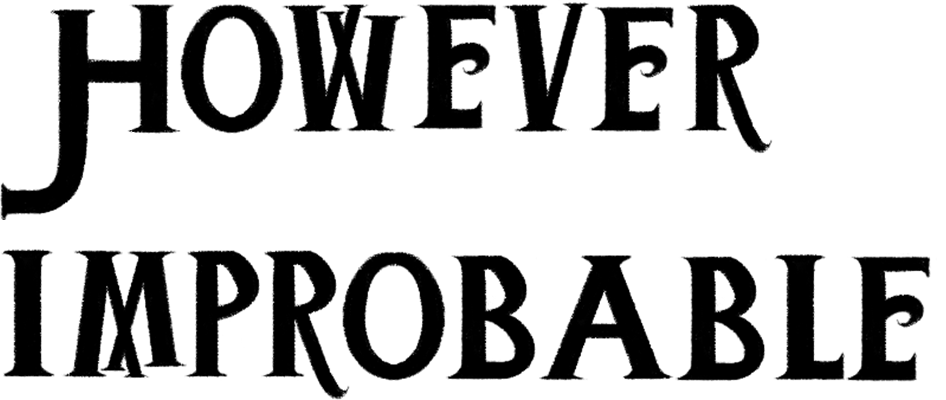The Sign of Four
A young woman named Mary Morstan comes to Baker Street with a most unusual problem… kicking off a tale of treasure, murder and romance. The Sign of Four is the second of four novella-length stories Doyle penned about Holmes and Watson. Spawning from an unusual dinner party with a literary editor and Oscar Wilde himself, it’s only the second Holmes story Doyle published. The Sign of Four blends decadence, imperialism, dark family secrets and literal buried treasure with an almost genre-bending romantic air and some interpersonal drama.
Part 1: Today, we're building a theoretical backbone for this story, and examining what Holmes's actions and conflicts symbolize. We discuss Holmes's drug use as a symbol for London as a whole, what Doyle might have been trying to say about empire and power, and how SIGN is kind of like a noir.
Part 2: We dive into the story's messy and rather sad interpersonal drama by shining a light on the most understated of narrators - Dr. Watson himself, and the tension that is dividing his heart. Join us for a 221B vibe check (spoilers: bad vibes) as we take a look at the state of Holmes and Watson's friendship, and why Watson makes a choice that threatens it. Do we die defending Miss Mary Morstan? Is Doyle actually just a bad writer? Is The Sign of Four the queerest story in the canon?
Further reading:
“My Dear Holmes: Examining Sedgwick’s Theory of Homosociality in The Sign of Four.” The Baker Street Journal, 2011, by Mary Alcaro.
“The Case of the Domesticated Aesthete.” The Virginia Quarterly Review, by Paul Barolsky
Oscar Wilde as a Character in Victorian Fiction by Angela Kingston
“Holmes at Home.” In the Company of Strangers: Family and Narrative in Dickens, Conan Doyle, Joyce, and Proust, by Barry McCrea
“Reimagining Masculinity in Victorian Criticism: Swinburne and Pater.” Sexualities in Britain, by Thaïs E. Morgan
“Addiction, Empire, and Narrative in Arthur Conan Doyle's The Sign of the Four” (1999) by Christopher Keep and Don Randall
“Performing the Imperial Abject: The Ethics of Cocaine in Arthur Conan Doyle’s The Sign of Four” (2012) by Benjamin O’Dell
“My Dear Holmes: Examining Sedgwick’s Theory of Homosociality in The Sign of Four.” The Baker Street Journal, by Mary Alcaro
“Reimagining Masculinity in Victorian Criticism: Swinburne and Pater.” Sexualities in Britain, by Thaïs E Morgan
A Master of Djinn: The Dead Djinn #1 by P. Djèlí Clark
Mexican Gothic by Silvia Moreno-Garcia
My Dearest Holmes by Rohase Piercy
Listen to our narration of the story below!
Part 1: Chapter 1 - 3
“My mind,” he said, “rebels at stagnation. Give me problems, give me work, give me the most abstruse cryptogram or the most intricate analysis, and I am in my own proper atmosphere.”
Part 2: Chapter 4 - 6
In the light of the lantern I read, with a thrill of horror, “The sign of the four.”
“In God’s name, what does it all mean?” I asked.
“It means murder,” said he, stooping over the dead man.
Part 3: Chapters 7 - 9
“It is a romance!” cried Mrs. Forrester. “An injured lady, half a million in treasure, a black cannibal, and a wooden-legged ruffian. They take the place of the conventional dragon or wicked earl.”
“And two knight-errants to the rescue,” added Miss Morstan, with a bright glance at me.
Part 4: Chapters 10 - 12
“For me,” said Sherlock Holmes, “there still remains the cocaine-bottle.” And he stretched his long white hand up for it.
The Sign of Four is narrated by Paula Brett. Paula is a queer, autistic theatremaker from London. Their practise includes clowning, puppetry, singing, dance, voiceover. and writing. Paula's show Villainex is all about queer identity, accessibility and what it is to really belong. You can ready more about Villainex HERE.
Paula is an experienced voice artist. They have worked with Inrix Media for 8 years providing traffic and travel bulletins to radio stations across the South East, including BBC Local Radio, Smooth, Magic, Absolute and LBC. They can also be heard in award-winning podcast OBLIVITY, and in HYPATIA'S MATHEMATICAL MAZE for BBC Bitesize. Paula has contributed to Broccoli Productions ANTHEMS: PRIDE podcast, Drag Queen storyteller Mama G and the 2020 Virtual Collaborators Project. They are alumni of the Vital Xposure Wellspring program, and their play STATIC will receive a rehearsed reading at the Pen Theatre in June.
Music credit: The songs “Denmark (Live)” by the Portland Cello Project and Salut d'Amour by Edward Elgar are featured with an Attribution-Noncommercial-Share Alike license (https://creativecommons.org/licenses/by/4.0/).
